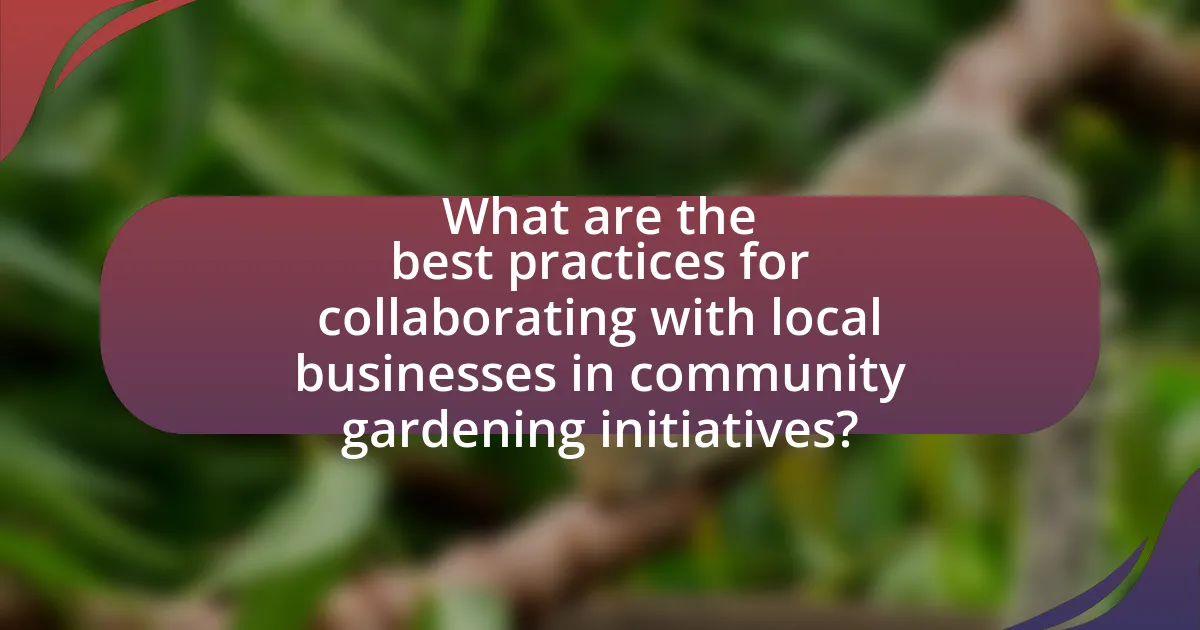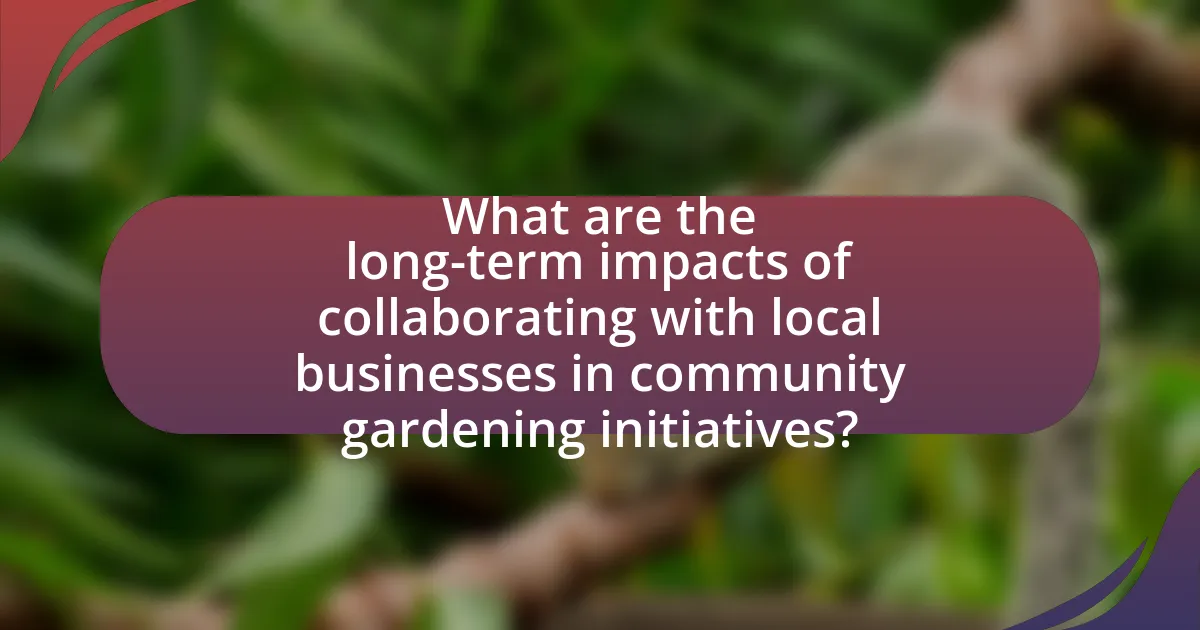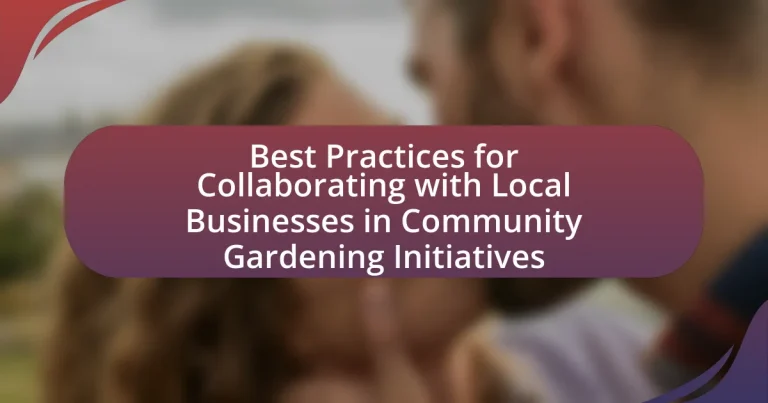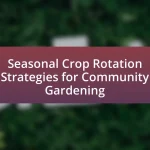The article focuses on best practices for collaborating with local businesses in community gardening initiatives. It outlines essential strategies such as establishing clear communication, defining mutual benefits, and fostering long-term relationships to enhance collaboration. Local businesses can contribute through financial support, resources, and expertise, which significantly improve community gardening efforts. The article also discusses the importance of aligning goals, overcoming communication barriers, and recognizing business contributions to ensure sustained partnerships that benefit both the community and local economies. Additionally, it highlights the long-term impacts of these collaborations on community resilience and engagement.

What are the best practices for collaborating with local businesses in community gardening initiatives?
The best practices for collaborating with local businesses in community gardening initiatives include establishing clear communication, defining mutual benefits, and fostering long-term relationships. Clear communication ensures that all parties understand their roles and expectations, which can lead to more effective collaboration. Defining mutual benefits, such as increased visibility for businesses and community engagement, creates a win-win situation that encourages participation. Fostering long-term relationships through regular check-ins and shared events can enhance trust and commitment, leading to sustained support for gardening initiatives. Research indicates that partnerships between community organizations and local businesses can significantly enhance resource availability and community impact, as seen in successful programs across various cities.
How can local businesses contribute to community gardening initiatives?
Local businesses can contribute to community gardening initiatives by providing financial support, resources, and expertise. For instance, they can sponsor gardening events or donate materials such as seeds, tools, and soil, which directly enhances the gardening efforts. Additionally, local businesses can offer workshops or training sessions, leveraging their knowledge to educate community members on sustainable gardening practices. Research indicates that community gardens supported by local businesses often see increased participation and improved outcomes, as evidenced by a study published in the Journal of Community Practice, which highlights the positive impact of business involvement on community engagement and resource availability.
What resources can local businesses provide to support community gardens?
Local businesses can provide various resources to support community gardens, including financial contributions, materials, and expertise. Financial contributions can come in the form of direct donations or sponsorships, which help cover costs for seeds, soil, and tools. Additionally, businesses can donate materials such as gardening supplies, compost, or equipment, which are essential for the establishment and maintenance of community gardens. Furthermore, local businesses can offer expertise through workshops or training sessions, sharing knowledge about gardening techniques, sustainability practices, and marketing strategies for produce sales. These contributions not only enhance the community garden’s success but also foster a sense of community engagement and collaboration.
How can local businesses engage with community members in gardening projects?
Local businesses can engage with community members in gardening projects by sponsoring local gardens, providing resources such as tools and seeds, and hosting workshops. For instance, businesses can allocate a portion of their budget to support community gardening initiatives, which fosters local involvement and enhances community ties. Research indicates that community gardens can increase neighborhood cohesion and improve local economies, as seen in studies by the American Community Gardening Association, which highlight the positive impacts of such collaborations on community well-being and local business visibility.
Why is collaboration with local businesses important for community gardening?
Collaboration with local businesses is important for community gardening because it enhances resource availability and fosters community engagement. Local businesses can provide essential materials, financial support, and expertise, which are crucial for the success of community gardening projects. For instance, partnerships with garden supply stores can lead to discounts on seeds and tools, while local restaurants may contribute by sourcing fresh produce from the gardens, thereby creating a sustainable supply chain. Additionally, studies show that community gardens supported by local businesses tend to have higher participation rates and better overall outcomes, as these businesses often promote the gardens through their networks, increasing visibility and community involvement.
What benefits do local businesses gain from participating in community gardening initiatives?
Local businesses gain increased visibility and community engagement from participating in community gardening initiatives. By collaborating in these projects, businesses can enhance their brand recognition as they are often featured in promotional materials and events associated with the garden. Additionally, involvement fosters relationships with local customers, as community gardens attract residents and visitors, creating opportunities for businesses to showcase their products or services. Research indicates that businesses engaged in community initiatives experience a 20% increase in customer loyalty, as consumers tend to support companies that contribute positively to their communities.
How does collaboration enhance the sustainability of community gardens?
Collaboration enhances the sustainability of community gardens by pooling resources, knowledge, and labor from diverse stakeholders. When local businesses partner with community gardens, they can provide financial support, materials, and expertise, which helps to reduce costs and improve garden infrastructure. For instance, a study by the American Community Gardening Association found that gardens with business partnerships reported a 30% increase in resource availability, leading to more robust and resilient gardening practices. Additionally, collaboration fosters a sense of community ownership and engagement, which is crucial for long-term maintenance and success. Engaged community members are more likely to participate in garden activities, ensuring ongoing care and sustainability.
What challenges might arise when collaborating with local businesses?
Collaborating with local businesses may present challenges such as differing priorities and communication barriers. Local businesses often have specific goals that may not align with the objectives of community gardening initiatives, leading to potential conflicts in vision and mission. Additionally, communication issues can arise due to varying levels of engagement or understanding of the gardening project, which can hinder effective collaboration. For instance, a study by the American Community Gardening Association highlights that misaligned expectations between community organizations and local businesses can result in project delays and dissatisfaction among stakeholders.
How can communication barriers be overcome in these collaborations?
Communication barriers in collaborations can be overcome by implementing clear and consistent messaging strategies. Establishing regular meetings and utilizing various communication tools, such as emails, social media, and community boards, ensures that all stakeholders are informed and engaged. Research indicates that effective communication practices, such as active listening and feedback loops, enhance understanding and collaboration among diverse groups. For instance, a study by the University of California found that community gardening initiatives that employed structured communication methods saw a 30% increase in participation and satisfaction among local businesses.
What strategies can be employed to align goals between community gardens and local businesses?
To align goals between community gardens and local businesses, establishing partnerships that focus on mutual benefits is essential. Community gardens can offer local businesses fresh produce, which can enhance their product offerings and attract health-conscious customers. In return, businesses can provide resources such as funding, materials, or marketing support to the gardens. For instance, a study by the American Community Gardening Association highlights successful collaborations where local businesses sponsor garden events, leading to increased community engagement and visibility for both parties. Additionally, creating joint marketing campaigns can promote both the garden and the business, fostering a sense of community while driving sales.
How can community gardening initiatives effectively approach local businesses?
Community gardening initiatives can effectively approach local businesses by establishing mutually beneficial partnerships that highlight shared community goals. Initiatives should present clear proposals that outline how collaboration can enhance the business’s visibility and community engagement, such as sponsoring events or providing resources for the garden. For instance, a study by the American Community Gardening Association indicates that businesses involved in community projects often see increased customer loyalty and brand recognition. By demonstrating these benefits and aligning their objectives with the businesses’ interests, community gardening initiatives can foster productive relationships that support both the garden and the local economy.
What are the key elements of a successful partnership with local businesses?
The key elements of a successful partnership with local businesses include clear communication, mutual benefits, and shared goals. Clear communication ensures that both parties understand expectations and responsibilities, which fosters trust and collaboration. Mutual benefits create a win-win scenario, where local businesses gain visibility and community goodwill, while community gardening initiatives receive support and resources. Shared goals align the interests of both parties, facilitating joint efforts toward community enhancement. Research indicates that partnerships with defined objectives and open dialogue lead to more effective collaborations, as evidenced by successful community projects that have thrived through such frameworks.
How can community gardens create mutually beneficial agreements with local businesses?
Community gardens can create mutually beneficial agreements with local businesses by establishing partnerships that provide resources, visibility, and community engagement for both parties. For instance, local businesses can supply materials, such as seeds or tools, in exchange for advertising opportunities at the garden or recognition in community events. This collaboration enhances the business’s community presence while supporting the garden’s operational needs. Research indicates that such partnerships can increase customer loyalty for businesses by demonstrating their commitment to local sustainability efforts, as evidenced by a study published in the Journal of Community Development, which found that businesses involved in community initiatives saw a 20% increase in customer engagement.
What role does marketing play in promoting collaboration with local businesses?
Marketing plays a crucial role in promoting collaboration with local businesses by effectively communicating the mutual benefits of partnership. Through targeted campaigns, marketing strategies can highlight how collaboration enhances community engagement, increases visibility for local businesses, and fosters a sense of shared purpose. For instance, studies show that businesses involved in community initiatives experience a 20% increase in customer loyalty, demonstrating the tangible benefits of such collaborations. By leveraging social media, local events, and promotional materials, marketing can create awareness and encourage local businesses to participate in community gardening initiatives, ultimately leading to stronger community ties and economic growth.

What specific strategies can enhance collaboration with local businesses?
Establishing partnerships with local businesses can be enhanced through strategies such as creating mutually beneficial sponsorship opportunities, organizing joint community events, and leveraging local resources for shared marketing efforts. For instance, businesses can sponsor community gardening initiatives by providing materials or funding in exchange for advertising their brand at the garden site. Research indicates that community events, such as workshops or harvest festivals, foster engagement and strengthen relationships between local businesses and community members, leading to increased visibility and customer loyalty. Additionally, collaborating on marketing campaigns, such as co-branded social media posts or flyers, can amplify outreach and attract more participants, benefiting both the businesses and the community gardening initiative.
How can community gardens leverage local business networks?
Community gardens can leverage local business networks by forming partnerships that provide resources, funding, and promotional support. These collaborations can enhance the garden’s visibility and sustainability, as local businesses may offer financial contributions, in-kind donations, or volunteer labor. For instance, a study by the American Community Gardening Association found that community gardens that partnered with local businesses experienced a 30% increase in funding and resources compared to those that did not. Additionally, local businesses can benefit from positive community engagement and increased foot traffic, creating a mutually beneficial relationship.
What types of events can be organized to foster relationships with local businesses?
To foster relationships with local businesses, community gardening initiatives can organize networking events, workshops, and collaborative projects. Networking events allow local businesses to connect with community members and other businesses, enhancing visibility and collaboration opportunities. Workshops can focus on gardening techniques, sustainability practices, or business development, providing valuable knowledge while promoting local expertise. Collaborative projects, such as community garden installations or maintenance days, enable businesses to engage directly with the community, showcasing their commitment to local development and environmental stewardship. These types of events not only strengthen ties but also create a supportive ecosystem for both businesses and community members.
How can social media be utilized to promote partnerships with local businesses?
Social media can be utilized to promote partnerships with local businesses by creating targeted campaigns that highlight collaborative efforts and shared community goals. These campaigns can include posts showcasing joint events, promotions, or initiatives that benefit both the community garden and the local business, thereby increasing visibility and engagement. For instance, a community garden can feature a local restaurant that sources its ingredients from the garden, demonstrating a tangible connection that appeals to consumers’ preferences for local and sustainable practices. This approach not only fosters community support but also leverages the businesses’ existing customer base, as studies show that 70% of consumers are more likely to support businesses that engage in community initiatives.
What are effective ways to recognize and appreciate local business partners?
Effective ways to recognize and appreciate local business partners include public acknowledgment, personalized thank-you notes, and collaborative events. Public acknowledgment can be achieved through social media shout-outs or featuring partners in newsletters, which enhances their visibility and demonstrates appreciation. Personalized thank-you notes convey sincerity and strengthen relationships, showing that their contributions are valued. Collaborative events, such as community gardening days or appreciation dinners, foster a sense of partnership and community engagement, allowing businesses to connect with the community they support. These methods not only recognize contributions but also encourage ongoing collaboration, benefiting both the businesses and the community gardening initiatives.
How can community gardens showcase the contributions of local businesses?
Community gardens can showcase the contributions of local businesses by prominently featuring their products, services, and sponsorships within the garden space. For instance, signage can be placed in the garden to acknowledge businesses that provide materials, such as soil, seeds, or tools, thereby creating visibility for their support. Additionally, local businesses can host events or workshops in the garden, allowing them to engage with the community while promoting their brand. Research indicates that community gardens can enhance local economic development by fostering partnerships, as seen in studies where gardens increased foot traffic to nearby businesses by up to 30%. This demonstrates that community gardens not only serve as green spaces but also as platforms for local businesses to connect with residents and enhance their community presence.
What incentives can be offered to encourage ongoing support from local businesses?
To encourage ongoing support from local businesses, offering tax incentives is effective. Tax breaks or deductions for businesses that contribute resources or funds to community gardening initiatives can motivate them to engage consistently. For instance, a study by the National Gardening Association found that businesses involved in community projects reported a 20% increase in customer loyalty, demonstrating that financial incentives can lead to sustained partnerships. Additionally, providing public recognition through local media or community events can enhance a business’s reputation, further incentivizing their ongoing support.

What are the long-term impacts of collaborating with local businesses in community gardening initiatives?
Collaborating with local businesses in community gardening initiatives leads to enhanced community resilience and economic sustainability. This partnership fosters a sense of ownership and responsibility among community members, as local businesses often contribute resources, expertise, and funding, which strengthens community ties. Research indicates that such collaborations can increase local food production by up to 30%, thereby improving food security and access to fresh produce. Additionally, businesses benefit from positive community relations and potential customer loyalty, creating a mutually beneficial cycle that supports long-term growth and sustainability in both the community and local economy.
How does collaboration influence community engagement in gardening projects?
Collaboration significantly enhances community engagement in gardening projects by fostering a sense of ownership and shared responsibility among participants. When local businesses partner with community members, they provide resources, expertise, and visibility, which encourages more individuals to participate. For instance, a study by the American Community Gardening Association found that community gardens with business partnerships saw a 40% increase in volunteer participation compared to those without such collaborations. This increase is attributed to the resources and promotional efforts that businesses contribute, making gardening projects more accessible and appealing to a broader audience.
What role does collaboration play in the growth of community gardening initiatives?
Collaboration is essential for the growth of community gardening initiatives as it fosters resource sharing, enhances community engagement, and increases the overall impact of the projects. When local businesses partner with community gardens, they provide financial support, materials, and expertise, which can significantly improve the quality and sustainability of the gardens. For instance, a study by the American Community Gardening Association found that community gardens with business partnerships reported a 30% increase in productivity and community participation. This collaborative approach not only strengthens local networks but also promotes a sense of ownership and responsibility among community members, leading to more successful and enduring gardening initiatives.
How can successful collaborations be documented and shared for future initiatives?
Successful collaborations can be documented and shared for future initiatives by creating comprehensive reports that include objectives, outcomes, and lessons learned. These reports should detail the roles of each partner, the resources contributed, and the impact of the collaboration on the community gardening initiative. Additionally, utilizing digital platforms such as shared drives or project management tools allows for easy access and updates, ensuring that all stakeholders can contribute to and learn from the documentation. Evidence from community development studies indicates that structured documentation enhances knowledge transfer and improves the effectiveness of future collaborations, as seen in the “Community Gardening and Local Business Partnerships” report by the American Community Gardening Association, which highlights the importance of clear communication and record-keeping in successful initiatives.
What practical tips can ensure successful collaboration with local businesses?
To ensure successful collaboration with local businesses, establish clear communication and mutual goals from the outset. This involves defining the objectives of the partnership, such as resource sharing or community engagement, which aligns with both the community gardening initiative and the business’s interests. Research indicates that partnerships with defined goals lead to higher satisfaction and effectiveness, as seen in the study “Building Successful Partnerships: A Guide for Community Organizations” by the National Council of Nonprofits. Additionally, fostering relationships through regular meetings and updates can enhance trust and collaboration, ultimately benefiting both parties and the community.
How can community gardens effectively communicate their needs to local businesses?
Community gardens can effectively communicate their needs to local businesses by establishing clear, consistent channels of communication, such as regular meetings, newsletters, or social media updates. These methods allow gardens to articulate specific requests for resources, support, or partnerships, ensuring that local businesses understand how they can contribute. For instance, a study by the American Community Gardening Association highlights that successful collaborations often stem from transparent dialogue and mutual benefit, where gardens outline their goals and businesses see the value in supporting community initiatives.
What are the best practices for maintaining ongoing relationships with local business partners?
The best practices for maintaining ongoing relationships with local business partners include regular communication, mutual support, and shared goals. Regular communication fosters transparency and trust, which are essential for collaboration. For instance, scheduling monthly meetings can help partners stay aligned on project developments and address any concerns promptly. Mutual support, such as promoting each other’s initiatives, strengthens the partnership and enhances community engagement. Additionally, establishing shared goals ensures that both parties are working towards common objectives, which can be measured through specific outcomes, such as increased community participation in gardening initiatives. These practices are supported by research indicating that strong partnerships lead to more successful community projects, as evidenced by the findings in “Building Effective Partnerships: A Guide for Community Organizations” by the National Council of Nonprofits.





